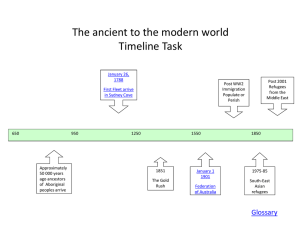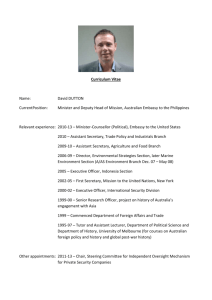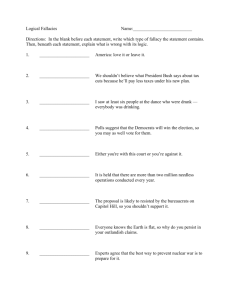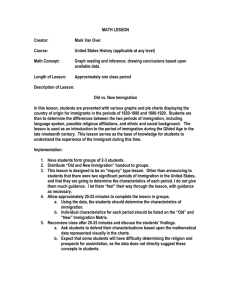Immigration Timeline Task
advertisement
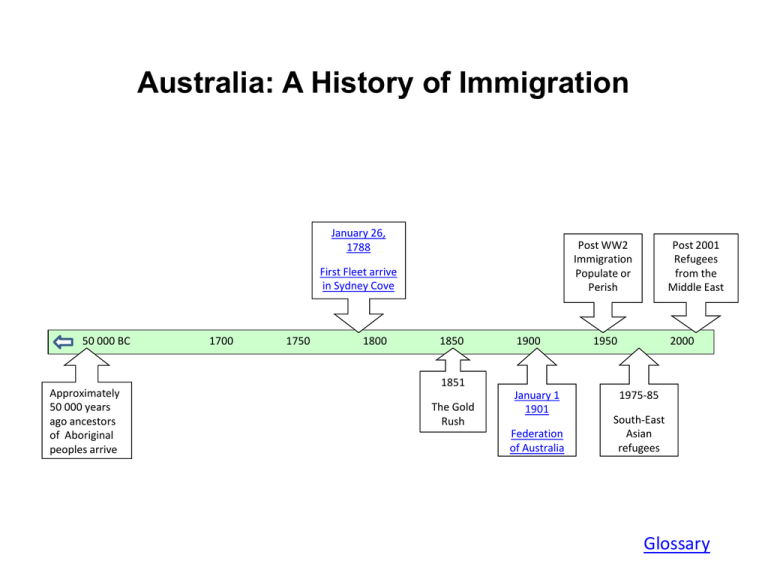
Australia: A History of Immigration January 26, 1788 Post WW2 Immigration Populate or Perish First Fleet arrive in Sydney Cove 50 000 BC Approximately 50 000 years ago ancestors of Aboriginal peoples arrive 1700 1750 1800 1850 1900 Post 2001 Refugees from the Middle East 1950 2000 1851 The Gold Rush January 1 1901 Federation of Australia 1975-85 South-East Asian refugees Glossary Immigration Timeline Task •Create a timeline outlining important immigration periods in Australian history. (Use the events we studied during the first lesson and, if you know it, add the time your family arrived). •Create a hyperlink from each period to a separate page. •On each page give more detail about that particular period, outlining: 1. The reasons for the event/ migration 2. Number of immigrants coming to Australia 3. Attitudes of Australians at the time 4. Government policy at the time 5. An image 6. Legacy (a brief description of what that particular group has added to Australian culture Eg. Workforce, artists, food •In the case of governmental action or developments, outline the significance of these events in relation to immigration policy – ie Federation To complete the task: 1. Open a new PowerPoint document 2. Copy the first slide from this document This will form the basis of your work 3. To use Hyperlink: 1. 1. Open a new slide Highlight the text Right click on the text Left click on “Hyperlink” Select “Place in This Document” Click on the new slide The First Fleet For approximately 50 000 years the first Australians lived in relative peace. After Captain James Cook discovered the east coast of New South Wales in 1770 a new fate of the continent was sealed. He reported to the British Government that New South Wales would be a suitable place for habitation and so it was decided to send eleven vessels, 9 of which contained criminals, to ease the pressure on English gaols. (1) reason. Previously the British had used America to dump its prisoners, but as America had defeated Britain in the American war of Independence (1775-1783), Britain was forced to stop this practice. Captain Arthur Phillip was commissioned oversee the monumental journey to New South Wales and establish a colony. The first Governor of New South Wales lead an expedition of eleven vessels containing approximately 780 convicts, 180 of whom were women, and approximately 200 marines and officers. (Turner,B. 1992) (2) number Back Federation and the Immigration Restriction Act On the First of January 1901 the six colonies federated to form the Nation of Australia. Immigration policy was a principle duty of the newly formed Federal Government. One of the first laws that it passed was the Immigration Restriction Act 1901. The purpose of the act was to preserve British culture and Influence. They achieved this by including a dictation test that potential immigrants had to pass (p14, Brash, 2009). In a further act to restrict ‘undesirable people’ from immigrating, the Australian Government allowed the immigration officials to set the dictation test in any European language they liked. This way they could force an English speaking person to sit the exam in an obscure language and thus fail. This policy of restriction became unofficially known as the White Australia Policy and was in use until the Whitlam Government. In 1901 the Pacific Island Labourers Act was also passed. This policy saw the removal of thousands of Pacific Islander workers known as Kanakas. The Immigration Restriction Act and White Australia Policy had widespread support. Powerful publications such as The Bulletin encourages nationalistic purity to both protect British Culture but also to protect Australian workers from cheap overseas labour (p20, Brash, 2009). Back Glossary Asylum Seeker Refugee UNHCR Multiculturalism Boat People Temporary Protection Visa Back
